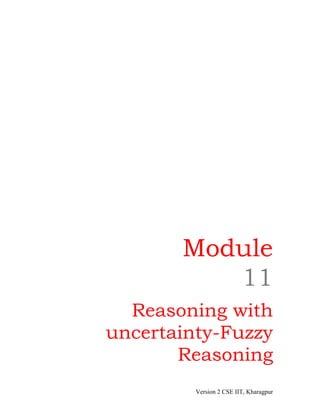
Fuzzy Reasoning and Uncertainty
- 1. Module 11 Reasoning with uncertainty-Fuzzy Reasoning Version 2 CSE IIT, Kharagpur
- 2. 11.1 Instructional Objective • The students should understand the use of fuzzy logic as a method of handling uncertainty • The student should learn the definition of fuzzy sets and fuzzy operations like union and intersection • Students should understand the use of hedges in linguistic description using fuzzy sets • Students should be able to convert linguistic description of a uncertain problem in terms of statements in fuzzy logic • Students should understand the fuzzy inferencing mechanism • Students should understand the steps of o Fuzzyfication o Fuzzy rule evaluation o Defuzzification • Students should understand the design of fuzzy expert systems At the end of this lesson the student should be able to do the following: • Represent a given problem using fuzzy logic • Design a fuzzy expert system for a given problem. Version 2 CSE IIT, Kharagpur
- 3. Lesson 30 Other Paradigms of Uncertain Reasoning Version 2 CSE IIT, Kharagpur
- 4. 11.2 Reasoning with Uncertainty Fuzzy systems is an alternative to traditional notions of set membership and logic that has its origins in ancient Greek philosophy, and applications at the leading edge of Artificial Intelligence. 11.2.1 THE PROBLEM: REAL-WORLD VAGUENESS Natural language abounds with vague and imprecise concepts, such as “Sally is tall," or "It is very hot today." Such statements are difficult to translate into more precise language without losing some of their semantic value: for example, the statement "Sally's height is 152 cm." does not explicitly state that she is tall, and the statement "Sally's height is 1.2 standard deviations about the mean height for women of her age in her culture" is fraught with difficulties: would a woman 1.1999999 standard deviations above the mean be tall? Which culture does Sally belong to, and how is membership in it defined? While it might be argued that such vagueness is an obstacle to clarity of meaning, only the most staunch traditionalists would hold that there is no loss of richness of meaning when statements such as "Sally is tall" are discarded from a language. Yet this is just what happens when one tries to translate human language into classic logic. Such a loss is not noticed in the development of a payroll program, perhaps, but when one wants to allow for natural language queries, or "knowledge representation" in expert systems, the meanings lost are often those being searched for. For example, when one is designing an expert system to mimic the diagnostic powers of a physician, one of the major tasks i to codify the physician's decision-making process. The designer soon learns that the physician's view of the world, despite her dependence upon precise, scientific tests and measurements, incorporates evaluations of symptoms, and relationships between them, in a "fuzzy," intuitive manner: deciding how much of a particular medication to administer will have as much to do with the physician's sense of the relative "strength" of the patient's symptoms as it will their height/weight ratio. While some of the decisions and calculations could be done using traditional logic, we will see how fuzzy systems affords a broader, richer field of data and the manipulation of that data than do more traditional methods. 11.2.2 HISTORIC FUZZINESS The precision of mathematics owes its success in large part to the efforts of Aristotle and the philosophers who preceded him. In their efforts to devise a concise theory of logic, and later mathematics, the so-called "Laws of Thought" were posited. One of these, the "Law of the Excluded Middle," states that every proposition must either be True or False. Even when Parminedes proposed the first version of this law (around 400 B.C.) there were strong and immediate objections: for example, Heraclitus proposed that things could be simultaneously True and not True. Version 2 CSE IIT, Kharagpur
- 5. It was Plato who laid the foundation for what would become fuzzy logic, indicating that there was a third region (beyond True and False) where these opposites "tumbled about." Other, more modern philosophers echoed his sentiments, notably Hegel, Marx, and Engels. But it was Lukasiewicz who first proposed a systematic alternative to the bi- valued logic of Aristotle. In the early 1900's, Lukasiewicz described a three-valued logic, along with the mathematics to accompany it. The third value he proposed can best be translated as the term "possible," and he assigned it a numeric value between True and False. Eventually, he proposed an entire notation and axiomatic system from which he hoped to derive modern mathematics. Later, he explored four-valued logics, five-valued logics, and then declared that in principle there was nothing to prevent the derivation of an infinite-valued logic. Lukasiewicz felt that three- and infinite-valued logics were the most intriguing, but he ultimately settled on a four-valued logic because it seemed to be the most easily adaptable to Aristotelian logic. Knuth proposed a three-valued logic similar to Lukasiewicz's, from which he speculated that mathematics would become even more elegant than in traditional bi-valued logic. His insight, apparently missed by Lukasiewicz, was to use the integral range [-1, 0 +1] rather than [0, 1, 2]. Nonetheless, this alternative failed to gain acceptance, and has passed into relative obscurity. It was not until relatively recently that the notion of an infinite-valued logic took hold. In 1965 Lotfi A. Zadeh published his seminal work "Fuzzy Sets" which described the mathematics of fuzzy set theory, and by extension fuzzy logic. This theory proposed making the membership function (or the values False and True) operate over the range of real numbers [0.0, 1.0]. New operations for the calculus of logic were proposed, and showed to be in principle at least a generalization of classic logic. Version 2 CSE IIT, Kharagpur
